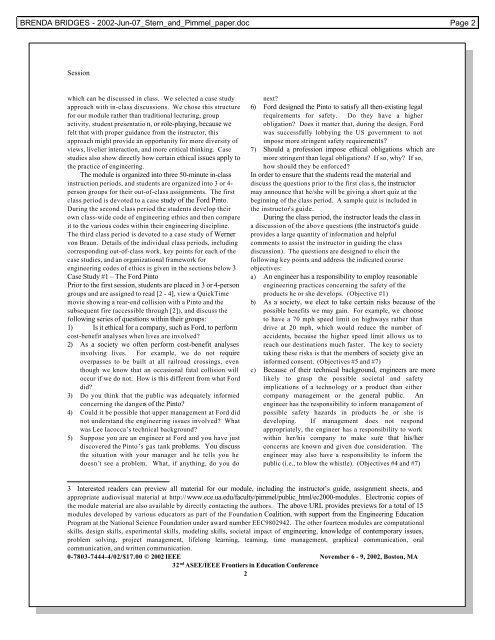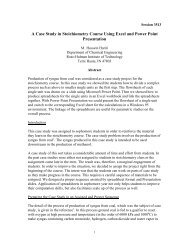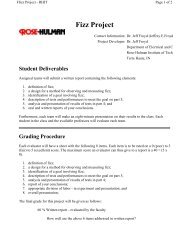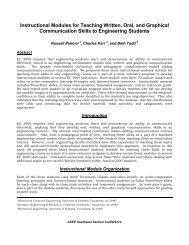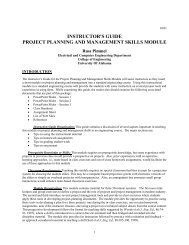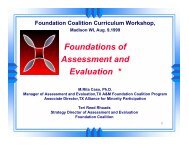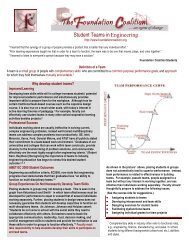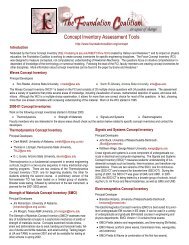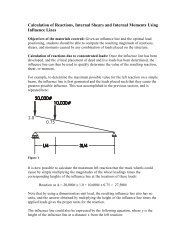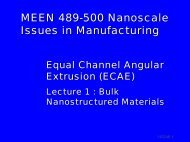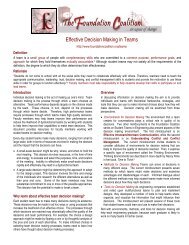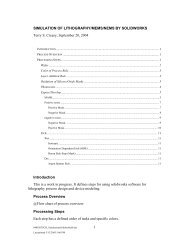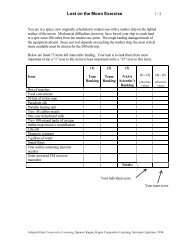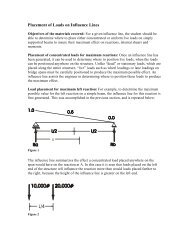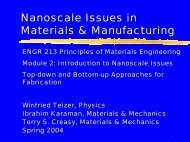Paper - Foundation Coalition
Paper - Foundation Coalition
Paper - Foundation Coalition
Create successful ePaper yourself
Turn your PDF publications into a flip-book with our unique Google optimized e-Paper software.
BRENDA BRIDGES - 2002-Jun-07_Stern_and_Pimmel_paper.doc Page 2<br />
Session<br />
which can be discussed in class. We selected a case study<br />
approach with in-class discussions. We chose this structure<br />
for our module rather than traditional lecturing, group<br />
activity, student presentatio n, or role-playing, because we<br />
felt that with proper guidance from the instructor, this<br />
approach might provide an opportunity for more diversity of<br />
views, livelier interaction, and more critical thinking. Case<br />
studies also show directly how certain ethical issues apply to<br />
the practice of engineering.<br />
The module is organized into three 50-minute in-class<br />
instruction periods, and students are organized into 3 or 4-<br />
person groups for their out-of-class assignments. The first<br />
class period is devoted to a case study of the Ford Pinto.<br />
During the second class period the students develop their<br />
own class-wide code of engineering ethics and then compare<br />
it to the various codes within their engineering discipline.<br />
The third class period is devoted to a case study of Werner<br />
von Braun. Details of the individual class periods, including<br />
corresponding out-of-class work, key points for each of the<br />
case studies, and an organizational framework for<br />
engineering codes of ethics is given in the sections below 3<br />
Case Study #1 – The Ford Pinto<br />
Prior to the first session, students are placed in 3 or 4-person<br />
groups and are assigned to read [2 - 4], view a QuickTime<br />
movie showing a rear-end collision with a Pinto and the<br />
subsequent fire (accessible through [2]), and discuss the<br />
following series of questions within their groups:<br />
1) Is it ethical for a company, such as Ford, to perform<br />
cost-benefit analyses when lives are involved?<br />
2) As a society we often perform cost-benefit analyses<br />
involving lives. For example, we do not require<br />
overpasses to be built at all railroad crossings, even<br />
though we know that an occasional fatal collision will<br />
occur if we do not. How is this different from what Ford<br />
did?<br />
3) Do you think that the public was adequately informed<br />
concerning the dangers of the Pinto?<br />
4) Could it be possible that upper management at Ford did<br />
not understand the engineering issues involved? What<br />
was Lee Iacocca’s technical background?<br />
5) Suppose you are an engineer at Ford and you have just<br />
discovered the Pinto’s gas tank problems. You discuss<br />
the situation with your manager and he tells you he<br />
doesn’t see a problem. What, if anything, do you do<br />
next?<br />
6) Ford designed the Pinto to satisfy all then-existing legal<br />
requirements for safety. Do they have a higher<br />
obligation? Does it matter that, during the design, Ford<br />
was successfully lobbying the US government to not<br />
impose more stringent safety requirements?<br />
7) Should a profession impose ethical obligations which are<br />
more stringent than legal obligations? If so, why? If so,<br />
how should they be enforced?<br />
In order to ensure that the students read the material and<br />
discuss the questions prior to the first clas s, the instructor<br />
may announce that he/she will be giving a short quiz at the<br />
beginning of the class period. A sample quiz is included in<br />
the instructor’s guide.<br />
During the class period, the instructor leads the class in<br />
a discussion of the above questions (the instructor’s guide<br />
provides a large quantity of information and helpful<br />
comments to assist the instructor in guiding the class<br />
discussion). The questions are designed to elicit the<br />
following key points and address the indicated course<br />
objectives:<br />
a) An engineer has a responsibility to employ reasonable<br />
engineering practices concerning the safety of the<br />
products he or she develops. (Objective #1)<br />
b) As a society, we elect to take certain risks because of the<br />
possible benefits we may gain. For example, we choose<br />
to have a 70 mph speed limit on highways rather than<br />
drive at 20 mph, which would reduce the number of<br />
accidents, because the higher speed limit allows us to<br />
reach our destinations much faster. The key to society<br />
taking these risks is that the members of society give an<br />
informed consent. (Objectives #5 and #7)<br />
c) Because of their technical background, engineers are more<br />
likely to grasp the possible societal and safety<br />
implications of a technology or a product than either<br />
company management or the general public. An<br />
engineer has the responsibility to inform management of<br />
possible safety hazards in products he or she is<br />
developing. If management does not respond<br />
appropriately, the engineer has a responsibility to work<br />
within her/his company to make sure that his/her<br />
concerns are known and given due consideration. The<br />
engineer may also have a responsibility to inform the<br />
public (i.e., to blow the whistle). (Objectives #4 and #7)<br />
3 Interested readers can preview all material for our module, including the instructor’s guide, assignment sheets, and<br />
appropriate audiovisual material at http://www.ece.ua.edu/faculty/pimmel/public_html/ec2000-modules. Electronic copies of<br />
the module material are also available by directly contacting the authors. The above URL provides previews for a total of 15<br />
modules developed by various educators as part of the <strong>Foundation</strong> <strong>Coalition</strong>, with support from the Engineering Education<br />
Program at the National Science <strong>Foundation</strong> under award number EEC9802942. The other fourteen modules are computational<br />
skills, design skills, experimental skills, modeling skills, societal impact of engineering, knowledge of contemporary issues,<br />
problem solving, project management, lifelong learning, teaming, time management, graphical communication, oral<br />
communication, and written communication.<br />
0-7803-7444-4/02/$17.00 © 2002 IEEE November 6 - 9, 2002, Boston, MA<br />
32 nd ASEE/IEEE Frontiers in Education Conference<br />
2


